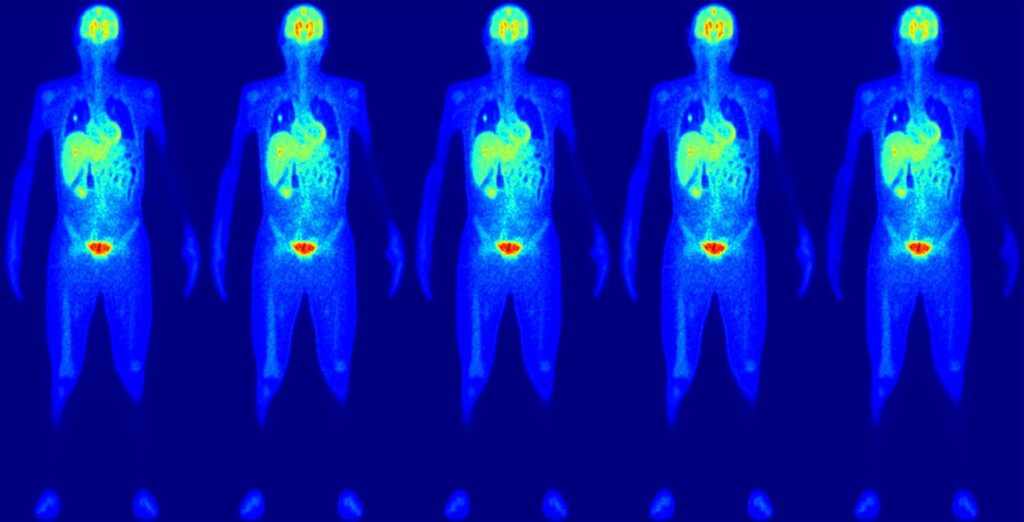IMPET

Title: Industrial Multiphoton PET Tomography
Acronym: IMPET
Programme of Foundation for Polish Science: First Team FENG ( 27
accepted out of 202 projects)
Timeline: 1.02 2025 – 31.01 2028
Contract number: FENG.02.02-IP.05-0152/23
Principal Investigator: Wojciech Krzemien (National Centre for Nuclear
Research)
Scientific cooperation:
Beatrix Hiesmayr (University of Vienna)
David Sarrut (Laboratoire CREATIS, Lyon)
Commercial cooperation: Creotech Instruments S.A.
Total budget: 3 923 769,09 PLN (about 940K euro)
The IMPET project aims to develop innovative, AI-enhanced solutions for industrial multiphoton imaging with high temporal resolution. The project introduces a novel approach by incorporating quantum decoherence modelling as complementary information to spatial distributions obtained in current industrial tomography.
IMPET focuses on two applications
Dynamic Flow Imaging
The first application targets the imaging of dynamic flows in granular systems and opaque fluids, such as liquid metals used in the cooling of nuclear reactors or advanced electronics for artificial intelligence. These systems are challenging to study with optical methods due to their opacity. The proposed imaging approach will enable the characterization of flow dynamics in such environments, addressing a major knowledge gap.
3D Imaging of Porous Materials
The second application involves high-resolution three-dimensional imaging of porous materials, e.g those used in osmotic membranes for
seawater desalination and renewable energy systems. The enhanced imaging capability will enable precise analysis of internal structures, allowing
not only the quantification of pore sizes and defects but also their spatial localisation.
Scientific collaboration
In collaboration with a group from the University of Vienna led by Beatrix Hiesmayr, pioneering research will be conducted on utilising the quantum properties of an entangled photon system in interaction with matter. Modelling the decoherence phenomenon gives insight into complementary measurements of material properties.
To ensure high image quality, AI-based correction and noise reduction techniques will be integrated at an early stage of data processing. Finally, an in-depth performance analysis of the scanner will be conducted using advanced Monte Carlo simulations, in cooperation with David Sarrut (Laboratoire CREATIS, Lyon).
IMPET goals
The project plans to develop an enhanced Positron Emission Particle Tracking (PEPT) method capable of tracking a large number of radiotracers simultaneously. This will support efficient imaging of large volumes.
The outcome of the project will include the design of a cost-effective industrial scanner and dedicated image reconstruction software. Ultimately, the developed solutions will apply to both scientific laboratories and industrial research departments.

PET imaging
Positron Emission Tomography (PET) is currently one of the most accurate, non-invasive imaging techniques used in oncology diagnostics. According to the WHO, cancer is among the leading causes of mortality worldwide. Over the years, the number of diagnosed cancer cases has increased notably and this tendency is expected to continue. The medical scientists community agrees that the early and precise diagnosis of a patient is the most decisive factor in successful treatment.
PET examination allows for determining the size and location of the tumour cells by detection of special radio-pharmaceuticals, injected into the patient before the measurement. The substance of radio-pharmaceuticals is mainly collected in cancer cells where it undergoes radioactive decay via positron emission. After emission, the positron combines with an electron, and they annihilate. In most cases, the positron-electron annihilation produces two back-to-back photons. A dedicated pet scanner is used to detect the emitted photons while the final image of the patient is produced with the help of advanced reconstruction algorithms.
Our group is engaged in research of novel PET imaging methods in cooperation with scientists from the University of Vienna and CREATIS Lyon. We focus on the development of simulation methods, reconstruction algorithms and machine learning based analysis tools for total body PET systems, novel biomarkers and unconventional PET applications.
Research interests and activities
- PET low-level data reconstruction techniques using compressing sensing methods
- Novel Total Body PET image reconstruction algorithms
- Novel Positronium Lifetime imaging methods
- Remote image processing with Grid and Cloud models
- Machine Learning methods and applications to medical data processing
- Deep Learning
- Artificial data generation
- Parallelization of medical computing using GPUs and FPGAs
- Monte Carlo Simulations with the GATE and GEANT packages

Our publications

Team
Members
IMPET
- Wojciech Krzemień – PI (Homepage, Linkedin, Inspire )
- Mateusz Bała – MC Assistant / PhD student (Linkedin, Inspire)
- Konrad Klimaszewski – Senior Researcher (ResearchGate, Linkedin, Inspire )
- Michał Obara – AI Assistant / PhD student
- Lech Raczyński – Senior Researcher (Inspire)
- Roman Y. Shopa – Senior Researcher (Inspire)
PET Group
- Oleksandr Fedoruk
- Wojciech Wiślicki (Inspire)
Cooperation
- Beatrix Hiesmayr (University of Vienna)
- David Sarrut (CREATIS Lyon)
Former Members
- Przemysław Kopka
- Paweł Kowalski
- Rafał Masełek
- Jan Bielecki
- Julia Fedorova
- Paweł Konieczka
For candidates
The PET Group welcomes applications from students wishing to study for a PhD in Physics. We cooperate with universities on Eng, MSc and PhD studies in Physics and Computer Science. We normally have projects on various experimental topics ranging from Particle Physics through Data Analysis in medical applications to Software Engineering. If you are interested in consolidating your career pursuing research in Particle Physics or Medical Data Processing, we would be delighted to discuss your ideas at any time.
Contact
dr inż. Wojciech Krzemień
High Energy Physics Division
National Centre for Nuclear Research
PL-05-400 Otwock, Świerk
POLAND
e-mail: wojciech.krzemien@ncbj.gov.pl
dr inż. Konrad Klimaszewski
Software Engineering Division
National Centre for Nuclear Research
PL-05-400 Otwock, Świerk
POLAND
e-mail: konrad.klimaszewski@ncbj.gov.pl

